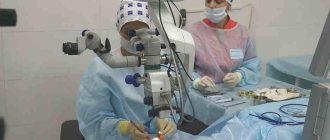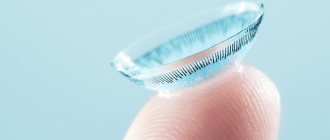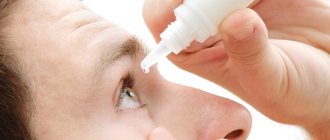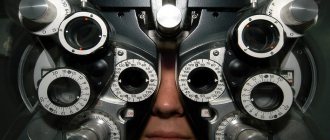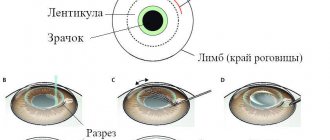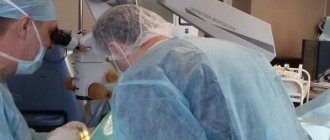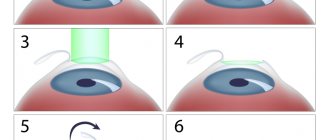Before and after laser vision correction
Before laser correction
After laser correction
Improved vision during laser correction occurs due to changes in the shape of the cornea, one of the natural lenses of the human eye. In this case, the depth of impact is limited to within microns; there is no negative effect on the internal structures of the eye.
Vast clinical experience has been accumulated in observing patients who have undergone laser vision correction, and today ophthalmologists say with confidence: if a diagnostic examination shows that there are no contraindications to the procedure, and after correction you follow all the doctor’s recommendations, good vision will remain for many years!*
*Vision deterioration is possible only due to natural age-related changes in the visual system that occur after 45-50 years, but this process does not depend on whether a correction procedure was carried out.
How quickly does vision recover after surgery?
The more competently the treatment is carried out, the better results the patient receives. Visual perception can be restored to a greater extent after surgery.
Vision begins to improve as soon as the hole in the retina closes. The veil before the eyes disappears. Peripheral vision is restored first, vision becomes almost normal, and then becomes completely normal.
If there was a detachment of the central zone, even a successful operation does not guarantee a cure. After surgery, vision will improve within 3 months, but will not be fully restored. Central visual perception is restored slowly and further improvement may be observed, but at an even slower pace.
After vitrectomy, the first results will appear in a few weeks or months.
It is important to understand that the period of improvement does not depend on the operation performed, but on correctly observed prevention during rehabilitation.
Before laser vision correction: how to prepare for the procedure?
So, if you decide to forget about glasses and contact lenses forever and gain good vision with laser correction, you need to:
- Undergo a vision diagnostic that will allow you to:
- draw up a complete picture of the state of the visual system, identify potential threats and possible contraindications to correction;
- prescribe, if necessary, additional procedures to strengthen eye tissue or stop progressive myopia;
- predict the result of the correction.
- Complete the necessary preoperative preparation:*
- general blood analysis;
- blood test for hepatitis B and C;
- blood test for RW;
- HIV test.
- If you wear soft contact lenses, then in order to obtain accurate diagnostic data and the highest quality laser correction, you must stop using them on the eve of diagnosis and a week before the procedure. Anyone who wears hard contact lenses is advised to stop using them for a month before the procedure.
- You should not drink alcohol two days before the correction.
*You can take all necessary tests at the Excimer clinic.
Early rehabilitation
Early rehabilitation is the first month after surgery. The following rules must be observed:
- Do not lift weights, engage in bodybuilding or use heavy dumbbells (barbells). The maximum weight of the item is 3 kg.
- Avoid contact sports - boxing, taekwondo, wrestling and others. You should not allow blows to hit the head; hemorrhage, detachment or other complication may occur.
- It is forbidden to tilt your head down. If necessary, do any action that involves tilting your head, ask your family for help. You can’t sleep on your stomach and wash your hair with it tilted back.
- It is contraindicated to visit places with high temperatures. These include baths, saunas, and solariums. Also, you should not take a hot bath or stay under the scorching rays of the sun for a long time.
- Minimize eye movements, try to sit at the computer less and use other gadgets. Don’t close your eyes and stay in a relaxed state more often.
- When going outside, wear safety glasses. Use sunglasses at any time of the year; if the operation was performed in winter, wear them too.
The main rule of the early rehabilitation period is to follow the doctor’s recommendations for taking medications. The medications prescribed by the doctor allow you to quickly restore retinal cells and prevent inflammatory and infectious processes.
After laser vision correction: we save the result!
- Vision correction is carried out in a “one-day” mode, without hospitalization, and you can return home on the same day. But after the procedure, you will have to spend about one or two hours in the clinic, this is necessary for the doctor to do a follow-up eye examination.
IMPORTANT!
After the correction, lacrimation is possible - do not rub your eyes under any circumstances, blot the tears on your cheek with a clean handkerchief or sterile napkin. Avoid touching your eyes during the first 24 hours after correction.
- Be sure to undergo control vision checks after 1, 3, 7, 14 days, as well as after a month and after a three-month period after the procedure (the exact schedule of visits to the clinic will be drawn up by your attending physician). If your visit is impossible, please notify the clinic reception staff.
- If necessary, your doctor may prescribe you special drops or other medications to prevent infection. Please note that drops, ointments, and eye gels can be used during the rehabilitation period after the procedure only as prescribed by a doctor!
- In the first hours after the procedure and during the day, if necessary, you can take sedatives and painkillers (analgin, baralgin, ketorol, etc.).
- On the first day after laser vision correction, try to sleep on your back.
- For 2-3 days after the procedure, do not allow soap or shampoo to get into your eyes.
- During the rehabilitation period (about a week) CONTRAINDICATED: contact with dirty water in the eyes, visiting a pool, bathhouse, sauna, swimming in reservoirs;
- physical activity associated with increased injury and heavy lifting (for example, dancing, contact and extreme sports, traumatic activities);
- use of decorative cosmetics, hairspray, aerosols;
Follow all the doctor’s recommendations and instructions - and the result of laser correction, good vision, will delight you for many years!
Selection of contact lenses
Most often, after surgery to restore vision, it is recommended to wear 3 types of contact lenses:
- Gas-permeable. These are rigid models that not only restore vision function, but also contribute to the formation of the shape of the outer surface of the eyeball. The patient's vision becomes stable when impaired, since during blinking their structure and shape do not change. This type of contact lens helps restore vision in cases of myopia, farsightedness and astigmatism.
- Hybrid. This type of model corrects eye function after laser vision restoration. They allow you to adapt your eyes to wearing them in order to subsequently switch to gas permeable lenses. This type has a softer structure compared to gas permeable lenses, but is more rigid than the soft model. The lenses effectively transmit oxygen and help moisturize the eyeball, so they are suitable even during the rehabilitation period.
- Modification. These contact lenses are designed individually for each patient. They may have a larger or smaller diameter, thickness of the edges, or curvature of the middle. They are effective for people who suffer from corneal pathologies. Many ophthalmologists believe that it is better to wear these types of contact lenses than to resort to laser methods of vision restoration, since they have a large number of complications.
After surgery, it is necessary not only to choose the right model of contact lenses, but also to use them correctly. This will prevent the inflammatory condition of the cornea, which was damaged during the operation. The risk of an infectious process that can penetrate into various structures of the visual organs will also be reduced.
Author's rating
Author of the article
Alexandrova O.M.
Articles written
2029
about the author
Was the article helpful?
Rate the material on a five-point scale!
( 1 ratings, average: 5.00 out of 5)
If you have any questions or want to share your opinion or experience, write a comment below.
The influence of alcohol on the rehabilitation period after correction
Alcohol is not harmful to a sick person or a healthy one. But it causes the most harm to patients who have undergone serious treatment or who have decided to undergo surgery.
The influence of alcohol on the rehabilitation period after laser vision correction:
- Decrease in the body's defenses. During the procedure, the doctor creates a flap on the cornea, that is, cuts off part of the epithelium from it. The procedure ends with its return to its place, but no stitches are placed. For the flap to grow properly and heal completely, the body needs time; this period is different for each patient and can range from 3 days to several weeks or months. If a person drinks alcoholic beverages, healing occurs more slowly. The immune system is not strong enough to respond to several pathological processes, take part in the restoration of the cornea, or rid the body of a toxic substance called alcohol.
- Under the influence of alcohol, the human body is more vulnerable to infection. The protective forces of the immune system are not directed towards the restoration of the operated eye. Excessive alcohol consumption reduces immunity, and this is a direct path to the rapid proliferation of pathogenic microorganisms that can lead to infection and the risk of other eye pathologies.
- The patient uses eye drops for several days after surgery. They are necessary to prevent the development of infection, relieve inflammation and pain. Many drugs cannot be combined with alcohol. This leads to the neutralization of most components of the medications used. That is, medications do not work, infections develop. In addition, it leads to complications and side effects.
- Alcohol increases intraocular pressure. This should not be allowed to prevent bleeding. It causes rupture of small blood vessels, resulting in hemorrhages.
- Excessive consumption of drinks causes problems with coordination. The person is unable to control movements. If you fall and hit your head, this can cause the flap to become dislodged, not heal properly, or the flap to fall off altogether. In this situation, repeat surgery will be required. This is not just additional money spending, but also repeated stress for the body.
Restrictions in the postoperative period
To ensure rapid tissue healing after surgery, certain restrictions must be observed for a short time. During the correction, the upper flap of the cornea was cut off to provide access to its inner layers subject to laser exposure. To create optimal conditions for the healing of the corneal flap within several weeks, you need to adhere to the following rules:
- eat well, get enough vitamins and water;
- use drops prescribed by your doctor;
- stop drinking alcohol;
- Avoid heavy physical activity and visiting swimming pools.
If you drink alcohol after vision correction, the following unpleasant consequences may occur:
- Alcohol reduces immunity, which negatively affects the body in the postoperative period and impairs the tissue healing process. The healing process is prolonged and the risk of inflammation increases.
- The use of drops prescribed by an ophthalmologist is incompatible with alcohol consumption. It is impossible to refuse anti-inflammatory drops, so you will have to refrain from drinking alcohol.
- Alcohol increases intraocular pressure.
- If you are heavily intoxicated, coordination of movements is impaired, which can lead to eye injury. During a fall or blow, the corneal flap that has not healed may become dislodged, requiring repeated surgery.
Subject to all restrictions and recommendations of the ophthalmologist during the postoperative period, rapid healing and preservation of the results for many years are guaranteed. The rehabilitation period takes only a few weeks, so it is not difficult to comply with the restrictions. The risks associated with drinking alcohol are too great, so it is better to give up alcohol until your vision is completely healed.
Despite the fact that drinking alcohol is not a direct contraindication, we recommend that you treat your health responsibly and avoid drinking alcoholic beverages during the postoperative period.
It is better to discuss the use of medications containing alcohol with your doctor, since in each case such a decision is made individually, taking into account the characteristics of the body. Yakovleva Yulia Valerievna
